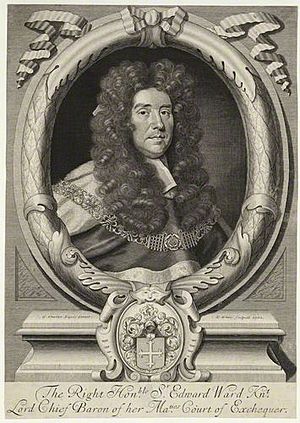Edward Ward (judge) facts for kids
Sir Edward Ward (1638–1714) was an important English lawyer and judge. He became a very senior judge called the Chief Baron of the Exchequer, which meant he was in charge of a special court dealing with money matters for the government. He is most famous for being the judge in the trial of the well-known pirate, Captain Kidd.
Contents
Early Life and Legal Career
Edward Ward was born in June 1638. He was the second son of William Ward from Preston, Rutland. He went to school in Wing, Rutland. Later, he studied law at Clifford's Inn and then at the Inner Temple. He became a lawyer in 1670. He soon became very good at his job, especially in the court that handled financial cases.
Important Cases and Roles
Edward Ward was connected with the Whig political group. In 1683, he was a lawyer for William Russell, Lord Russell. In 1684, he defended his father-in-law, Thomas Papillon, in a case where he was wrongly held prisoner. The judge, Chief Justice George Jeffreys, tried to stop Ward from speaking. But Ward kept going, even though the judge was difficult.
In 1689, King William III wanted Ward to be a judge. However, Ward politely said no. He preferred to work as a lawyer.
Becoming a Senior Judge
Edward Ward became the Attorney-General in 1693. This meant he was the chief legal advisor to the government. He was also made a knight, so he became "Sir Edward Ward."
In 1695, he was appointed Chief Baron of the Exchequer. This was a very important position. In 1701, he oversaw the famous trial of Captain Kidd. Captain Kidd and his friends were accused of piracy and murder. This was one of the biggest cases of Ward's career.
Later Life and Family
Sir Edward Ward passed away at his home in London on July 14, 1714. He was buried in Stoke Doyle, Northamptonshire, where he had bought land. A monument was later built there to remember him.
Ward's Family Life
In 1676, Edward Ward married Elizabeth Papillon. She was the daughter of the famous letter writer Jane and Thomas Papillon. Edward and Elizabeth had nine children who survived. Four of their sons also became successful lawyers.
Their oldest son, Edward, rebuilt the church in Stoke Doyle and put up a monument for his father there. One of their daughters, Jane, married Thomas Hunt. Another son, Thomas, worked as a diplomat in Russia.
 | James Van Der Zee |
 | Alma Thomas |
 | Ellis Wilson |
 | Margaret Taylor-Burroughs |


